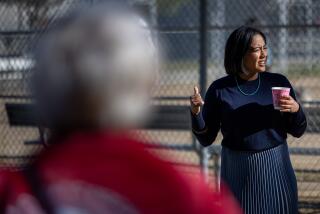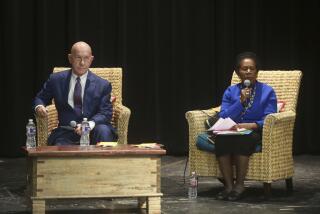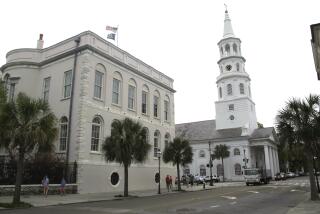Atlanta mayoral race ends in a near deadlock, as one candidate demands a recount
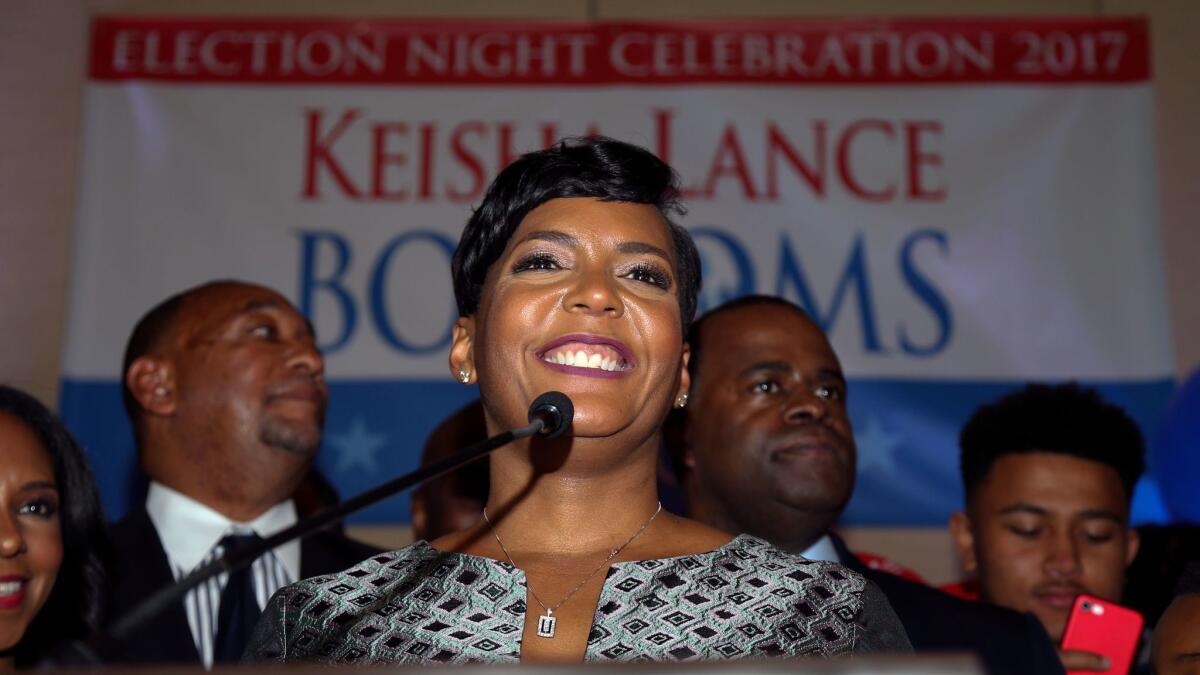
In a runoff election that drew into relief questions of race and political party allegiance, a black Democrat held a 759-vote lead over a white independent after the initial vote count early Wednesday to be the next mayor of Atlanta.
Keisha Lance Bottoms, an attorney and city councilwoman representing a predominantly black southwest district of the city, declared victory in a speech to supporters. “Dreams do come true,” she said.
But Mary Norwood, a longtime City Council member from the affluent neighborhood of Buckhead, asked for recount, saying absentee ballots from the military had not been counted and that the number of provisional ballots was still not known.
The vote totals were 46,464 for Bottoms and 45,705 for Norwood.
Atlanta has long promoted itself as a cradle of the civil rights movement and a mecca of black opportunity, and it has elected African American mayors since 1973. Rapid gentrification in this Democratic stronghold, where African Americans make up a slight but shrinking majority, threatened to change that in this election.
Bottoms, 47, won the highest number of votes in the November election. But she drew fierce criticism for her ties to current Mayor Kasim Reed, whose administration is embroiled in a federal investigation into city contracting.
She has also been rebuked for drawing two city salaries — as a city councilwoman and head of the Atlanta and Fulton County Recreation Authority — and failing for years to pay her water bills in full.
Norwood, 65, has earned a reputation for tirelessly attending neighborhood meetings and forums across the city and pushing a message of neighborhood inclusion and government transparency.
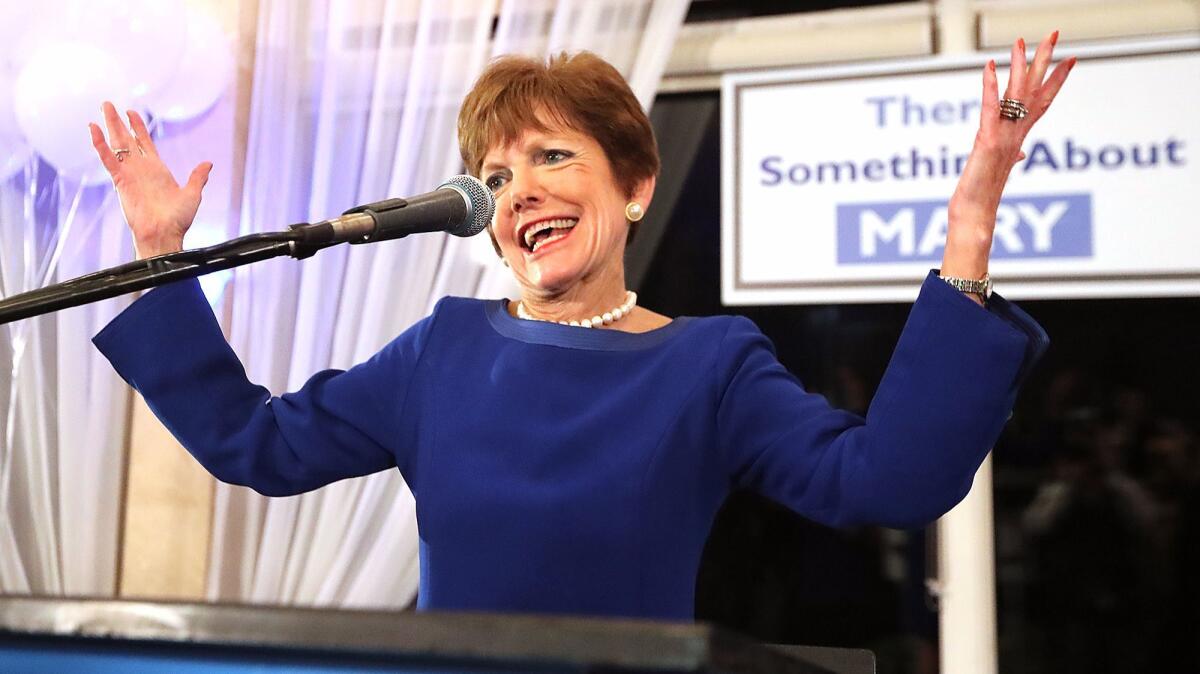
In some ways, the contest was a rerun of 2009, when Reed faced Norwood and won by just 714 votes. His supporters, like those of Bottoms, spread the rumor that Norwood is a closet Republican.
“She portrays herself as an independent voice, but … her brand of independence sure looks like that of a Republican,” states a website set up by the state’s Democratic Party, MarytheRepublican.com. It notes that Norwood’s campaign is staffed by Republicans and funded by GOP donors and reminds voters that Norwood declined to endorse moderate Democrat Jon Ossoff in his Georgia congressional race this year.
Critics of the state Democratic Party pushed back, insisting the nonpartisan election was a referendum on Reed, whom they dismiss as corrupt and too aligned with developers and big business.
As Atlanta has become more affluent and more white — African Americans fell from 61% of the population in 2000 to 54% in 2010 — some accuse Democratic leaders here of taking black voters for granted and ignoring key economic and criminal justice issues across the poorer, predominantly African American south of the city.
While Democratic U.S. Sens. Kamala Harris and Corey Booker and other prominent African Americans have backed Bottoms, other black leaders, including former Mayor Shirley Franklin and City Council President Ceasar Mitchell have endorsed Norwood.
“Some people say that endorsement may hurt my legacy, because I’ve endorsed a white woman over a black woman,” Franklin said in an ad for Norwood broadcast on black radio stations. “This election is about character, transparency and integrity. Not race.”
Last week, Cathy Woolard, a white former City Council president and one of the leading leftist candidates in the first round of voting, added her support for Norwood.
“I feel like the lack of transparency at City Hall has crushed the spirit of our city, and I feel like we need a clean break with this administration and a new start here with a fresh set of players,” Woolard said.
The runoff has been neck and neck, with some surveys showing Bottoms leading by a small margin and a poll conducted last week by WSB-TV and the Atlanta Journal-Constitution showing Norwood with a 6-percentage-point lead.
For George Chidi, a community activist and former reporter for the Journal-Constitution, much of the election debate had focused on “surface-level nonsense” about partisanship and skin color rather than pressing issues of gentrification, affordable housing and homelessness.
“The black political elite of the city have more or less counted on the city’s demography to carry them across the finish line for a generation,” Chidi wrote in “A Black Voter’s Case for Mary Norwood,” a blog post on www.GeorgiaPol.com. Meanwhile, he argued, “we have a city that has the Gini coefficient of Caracas, nearly the widest gap in racial income in the country, and the lowest income mobility in America.”
Another critic of Bottoms, Democratic state Rep. LaDawn Jones, the former director of the state’s Bernie Sanders presidential campaign, said she has admitted that she was at first reluctant to support Norwood — until it struck her that voting for Bottoms simply because she is a black Democrat was little different than a Republican voting for contentious Alabama Senate candidate Roy Moore just because he’s a conservative.
“If I am a person who puts ethics in government before all other factors, why hesitate about Norwood?” Jones wrote in a blog post for www.GeorgiaPol.com. “Could I not support Mary Norwood because she’s being pegged as Republican? Is party politics more important to me than good ethics and good judgment?”
Still, many black voters are wary of Norwood, saying she is not progressive enough on issues such as racial profiling.
When asked in a September forum if police “target or racially profile black and brown males in the community,” Norwood hesitated to answer while a row of candidates raised “Yes” signs. In a statement the next day, Norwood said she paused only “out of showing deference and support for our [Atlanta Police Department] officers who, to my knowledge, have not had reportedly high incidents of profiling.”
Jarvie is a special correspondent.
More to Read
Start your day right
Sign up for Essential California for news, features and recommendations from the L.A. Times and beyond in your inbox six days a week.
You may occasionally receive promotional content from the Los Angeles Times.
